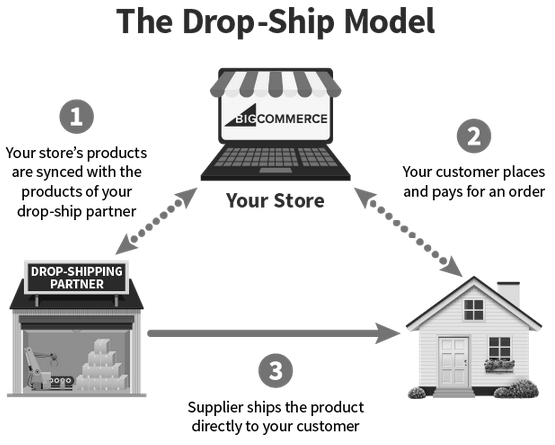Drop shipping is a fulfillment process in which merchants buy goods from a vendor who ships them directly to the consumer who bought them from the merchant. The best part is that the drop shipper remains completely invisible to the consumer.
Drop shipping differs from traditional fulfillment process in that the merchant doesn’t have to keep inventory on-hand. Instead, you only purchase stock from your drop shipper when you sell an item. This also means that you don’t have purchase a ton of inventory upfront to get your business started.
If you’re new to E-commerce, drop shipping is an effective way to select and sell different items. It works well for those just launching a new business or current merchants looking to diversify their product lines.
Just keep in mind that with drop shipping, you’re finding and selling products that a supplier offers. Successful drop shipping business often work best for products sold to niche markets, so there’s less competition to go against.
This means that your customers might have to wait for a product to be shipped from across the world. In addition, dropshipping does not necessarily allow you full control over inventory management and order fulfillment.
With drop shipping, you’re finding and selling products that a supplier offers. Successful drop shipping business often work best for products sold to niche markets, so there’s less competition to go against.

Advantages
- Easy to start: Dropshippers provide the products and the shipping, so all you need to do is focus on sales.
- Minimal business development: You’re leveraging the network of your dropshipper, instead of personally building the relationships with every supplier. Essentially, every new partner allows you to grow by a significantly large number of new products.
- More products, faster: Growth in ecommerce begins with adding more products to your website. Integrating a dropshipper’s products with your business is simple and straightforward because all you’re doing is supporting the links and learning the prices—not lining up any other part of the logistics. This allows more people to discover you and increases the number of touch points by which interested shoppers can encounter your brand.
- Affordable: Low overhead makes dropshipping a great starting place for online retailers. All you do is pay for inventory when a sale is made, so you avoid operational expenses like warehousing. Profitability is not guaranteed, though, which we’ll get to in the next section.
- Test before committing: Since you don’t incur overhead, you can test out the viability of new markets for existing products anywhere you can establish a drop-shipper service.
- Focus on what you do well: The convenience of a hands-off product fulfillment experience thereby enables businesses to focus on other priorities, which is especially advantageous to new companies.
Disadvantages
- No customization: Dropshipping usually means virtually no support for custom products. To achieve this type of support and customization, your dropshipper would have to function as a warehouse. Unfortunately, this is not likely unless their margins on custom products were worth the time and effort — in which case, the margins would likely not make sense for you.
- Lower quality control: Since the seller is removed from the fulfillment process, you’re entrusting your brand’s reputation to another party — while maintaining accountability. Buyers usually don’t think about fulfillment models or dropshippers. If a defective product arrives or there is a miscommunication about the shipment, your customer doesn’t want to hear that it was out of your control; all they care about is the overall experience.
- Reduced brand power: Your products are produced by others, so it’s more difficult to establish a unique brand. The reduced quality control only increases the risk to your brand.
- Competitive disadvantage: Low barriers to entry mean it’s hard to establish a competitive advantage over other businesses. You’re competing on price, and that can easily become a losing game.
- Scale: Logistics can become challenging as a business scales up, especially when coordinating with multiple dropshippers.

